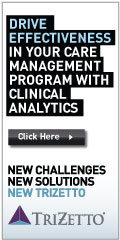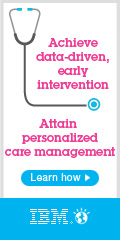Case Managers: Get Ready for More Patients
 Print this Article | Send to Colleague Print this Article | Send to Colleague
 Affordable Care Act to Eliminate Pre-Existing Limitation Waiting Periods Affordable Care Act to Eliminate Pre-Existing Limitation Waiting Periods
By Pat Stricker, RN, MEd
SVP of Clinical Services
TCS Healthcare Technologies
As of 2014, the Patient Protection and Affordable Care Act (PPACA) will require health plans to eliminate the pre-existing condition waiting period for all Americans. Individuals, who historically could not secure coverage due to cancer, congestive heart failure, and other medical conditions, now will be able to purchase health insurance.
In the meantime, the federal government is helping about 50,000 Americans obtain health coverage through the Pre-Existing Condition Insurance Plan (PCIP). "For too long, Americans with pre-existing conditions were locked out of the health care system and their health suffered," said HHS Secretary Kathleen Sebelius in a recent statement. "Thanks to health reform, our most vulnerable Americans across the country have the care they need." Launched in 2010, the PCIP Program is providing solid interim health care options until more become available to them in 2014, when PPACA is fully implemented.
The PCIP Program covers a broad range of health benefits, including primary and specialty care, hospital care, and prescription drugs. According to HHS, individuals who enroll in the PCIP Program are not charged a higher premium because of their medical conditions. Individuals pay comparable premium rates to healthy people in the individual insurance market. Premiums may be adjusted only on the basis of age, geographic area and tobacco use. Income is not considered.
With millions of more Americans likely to enroll in health plans over the next several years, case managers need to be prepared. As health care providers, we would like to see as many people as possible receive the medical care that they require—insurance or no insurance. However, realistically speaking, there is only so much time in a day, and so many patients that we can manage. The increased patient load could be overwhelming, so case managers need to be proactive and start to plan now to take advantage of all resources available to them.
For instance, in October 2011, CMSA launched a new free tool—the Case Load Capacity Calculator (CLCC). The CLCC, designed for health plans and inpatient acute settings, can be used to help analyze what the case load capacity is and should be for an organization. Knowing that information now will make it easier to be better prepared to handle increased case loads in the future. CMSA’s initiative is an excellent example of how information technology can assist in the day-to-day practice for case managers. Click here to try out the Case Load Capacity Calculator.
Another important factor in handling increased case loads will be the ability for case managers to have software applications that have been configured to automate workflows and regulatory requirements, so they can continue to focus on the patients. These applications will help case managers handle larger case loads, while still providing quality services and outcomes to the patients and profitability for the organization.
However, the most important thing is to be proactive and start re-designing processes now to make them more automated and efficient. Once the overall processes are revised, work with the Information Systems team to re-configure the medical management system to accommodate these streamlined workflows. If manual paper processes are still being used, this may be the time to justify the need for a medical management system. It could be something as simple and easy as CMSA’s Acuity AnyWare product or a larger, integrated system. With overall improvements in efficiency, productivity, quality, and increased reporting capabilities, a system should be able to demonstrate a suitable return on investment.
There is no question we live in exciting times. The importance of case managers will only grow and expand as the U.S. health care system continues to evolve. It is increasingly important to take advantage of every resource available to assist in managing our patient load and helping us to provide the best care possible.
To contact Pat Stricker:
Email her at pstricker@tcshealthcare.com or
reach her by phone at (530) 886-1700 ext. 215.    
|
Follow us on:



|







